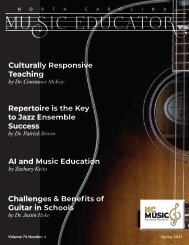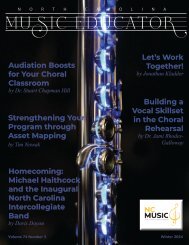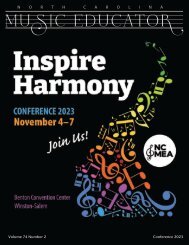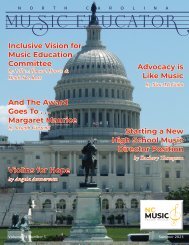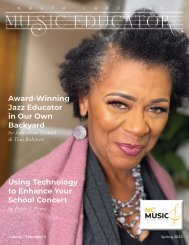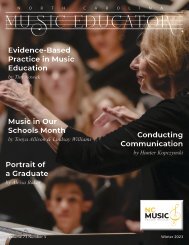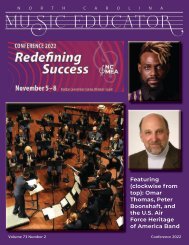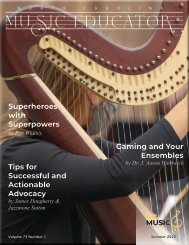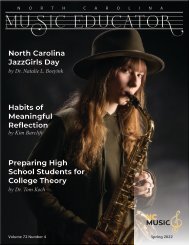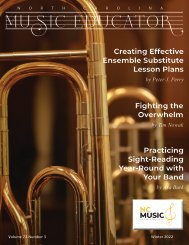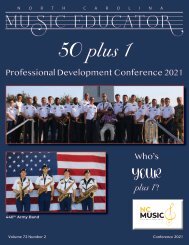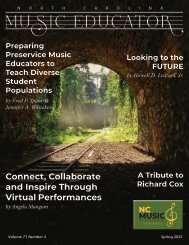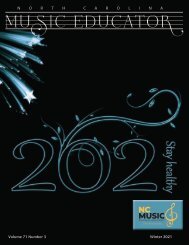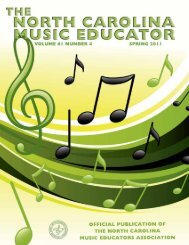North Carolina Music Educator Journal Summer 2021
Professional journal for North Carolina music educators, Summer 2021
Professional journal for North Carolina music educators, Summer 2021
You also want an ePaper? Increase the reach of your titles
YUMPU automatically turns print PDFs into web optimized ePapers that Google loves.
Elementary<br />
<strong>Summer</strong> of <strong>2021</strong>, waaaaaay better than summer of 2020.<br />
We all made it through the crazy pandemic school year<br />
where changes happened on almost a monthly basis. It<br />
was exhausting. New technology (soooooo much technology!),<br />
teaching in masks, social distancing, virtual students, minimal<br />
singing and instrument playing for a little while. More parent<br />
contacts, online assignment platforms, Zooms/Google Meets,<br />
Social Emotional Learning. Quarantine, temperature checks,<br />
disinfectant, lots of attendance forms. No concerts, dances, family<br />
nights, community performances. The most difficult year for<br />
veteran teachers, and a strange time for new teachers coming into<br />
the profession.<br />
It’s time to recharge our batteries.<br />
And what happens when you charge something? The battery<br />
level goes from nearly nothing to 100%. There is a chemical<br />
reaction within the cell that stores electrical energy, to be used<br />
later. How long will the charge last? Depends on how much you<br />
use the energy! My friends, we have abused our batteries this past<br />
year! What happens when you keep recharging the same battery?<br />
The energy storage of a battery can be divided into three<br />
sections known as the available energy that can instantly be<br />
retrieved, the empty zone that can be refilled, and the unusable<br />
part that has become inactive as part of use and aging.<br />
As the unusable portion of the battery grows, the charge time<br />
shortens because there is less to fill. In most cases, the decrease is<br />
linear and capacity fade is mostly a function of cycle count and age.<br />
A deep discharge stresses the battery more than a partial discharge.<br />
It is therefore better not to discharge the battery fully but charge it<br />
more often. Lithium- and nickel-based batteries deliver between<br />
300 and 500 full discharge/charge cycles before the capacity drops<br />
below 80 percent.<br />
Specifications of a device are always based on a new battery.<br />
This is only a snapshot, which cannot be maintained over any<br />
length of time. As with any shiny new machine, the battery<br />
will fade and if left unchecked, the reduced runtime can lead to<br />
battery-related breakdowns. A pack should be replaced when the<br />
capacity drops to 80 percent; however, the end-of-life threshold<br />
can vary according to application, user preference and company<br />
policy.<br />
As teachers, we really are like batteries. The more we do those<br />
Dawn Wilson, Chair<br />
quick weekend recharges, the less capacity we have over time.<br />
There are many ways in which we can recharge our personal and<br />
professional batteries, and it is unique to the individual. As music<br />
teachers, we have ways of quickly recharging as needed when we<br />
engage in our own personal music making. What we all know,<br />
however, is that summers ARE needed for recharging. Based on<br />
the above description, we have used our batteries throughout the<br />
year and summers are needed for REPLACING batteries.<br />
I took a quick survey of teachers, and the number one thing<br />
we do during the summer is: Spending time with family and<br />
friends. Not surprising, many of us spend time with TEACHER<br />
friends. Forty-eight percent of us! Other answers repeated often<br />
include: time outside (beach, hiking/walking, boating, kayaking),<br />
vacations/travel, SLEEP, reading, video games, TV, and hobbies.<br />
Everything on the list is predictable, all of these activities<br />
make perfect sense! We should all be engaging in several of them<br />
each summer in order to obtain our new batteries for the new<br />
school year. What is a little curious, however, is an activity that<br />
was absent from the list this year that I always hear: Professional<br />
Development.<br />
Nearly every teacher I know does some type of professional<br />
development over the summer, even if it is on their own,<br />
researching ideas for the coming school year. Interesting that not<br />
one person had that answer this year, and yet…. We all have had<br />
more training on technology this past year than we have in the past<br />
10. We have been given so many more tools, we can go into the<br />
new <strong>2021</strong> – 22 school year well prepared and READY.<br />
What are all the positives we gained this past pandemic year?<br />
• Streamlining our teaching of the standards and objectives.<br />
We’ve learned what is most important, and how we can best<br />
implement new strategies, provide differentiation.<br />
• Increased knowledge of sanitizing instruments, air<br />
exchange/filter rates.<br />
• Better student/family communication.<br />
• If we have to meet as a class online, breakout rooms for<br />
group work and sectionals.<br />
• Technology Tools: Zoom, Teams, Meets, Google Classroom,<br />
Schoology, Dojo, Seesaw, Nearpod, Flipgrid, Audacity, and<br />
on and on.<br />
• Social skills are important; for students and teachers.<br />
• Time management.<br />
• Students learning more life skills at home.<br />
• The importance of the arts for emotional health.<br />
And another survey question, What inspires you to keep<br />
teaching? Ninety-eight percent answered it’s the students. The kids.<br />
“I love helping students grow in knowledge, and as citizens<br />
and individuals.”<br />
“Knowing I make a difference in the lives of so many children.”<br />
“Teaching is my passion. I don’t know what else that would<br />
give me this fulfillment.”<br />
“I love the classroom community I help to build.”<br />
“It’s a job with purpose.”<br />
“I love the kids, I love to learn with them. I want to pass a love<br />
for learning to the next generation.”<br />
“Building those relationships with ‘bad’ students and helping<br />
them see their potential and achieve greatness.”<br />
“Knowing I am working to positively impact my community.”<br />
“Those ‘aha!’ and light bulb moments.”<br />
“Seeing kids grow in confidence and skills.”<br />
“Students that come back later and say thank you.”<br />
If you have read this far, you have probably nodded in<br />
agreement a few times, or shaken your head because this is nothing<br />
it's time<br />
TO START A<br />
Tri-M MUSIC<br />
honor<br />
SOCIETY CHAPTER<br />
new. You already know all of this information. And guess what?<br />
That’s exactly what makes all of us a community, what connects us;<br />
we have all responded in different ways, had to teach in different<br />
situations, make choices, and yet… at the core… we are all the<br />
same. How reassuring to know we are not alone. So when you are<br />
feeling overwhelmed, reach out to a teacher friend. When you<br />
need to vent, when you need support, find that teacher bestie from<br />
work. When you find some new awesome activity you want to<br />
try next year, or a list of books you want to purchase, new music,<br />
new instruments… reach out to a teacher friend and let them get<br />
excited with you.<br />
Cue music:<br />
“We’re All in This Together” from High School <strong>Music</strong>al or<br />
“You’ve Got a Friend in Me” from Toy Story. “That’s What Friends<br />
Are For” from the Jungle Book (or if you like the Dionne Warwick<br />
song better, listen to that one!) “I’ll Be There for You” by the<br />
Rembrandts. So many to choose from.<br />
If you haven’t recruited anyone to the many benefits of NCMEA<br />
membership, please share info about our organization. If you<br />
haven’t been actively involved in your section, please consider<br />
sharing your ideas. I urge you to attend the NCMEA Professional<br />
Development Conference in Winston-Salem, November 6 – 9.<br />
Go out and get those new batteries! The <strong>2021</strong> – 22 school year<br />
is going to be a time of rebuilding programs and getting back out<br />
into the community. I can hardly wait to see and hear about all the<br />
positive changes across our state. Please stay in touch, and know<br />
that the elementary board wants your participation and input.<br />
Strengthen your school’s<br />
<strong>Music</strong>. Honor. And Society.<br />
Starting a Tri-M ® <strong>Music</strong> Honor<br />
Society chapter will help show the<br />
value of your music program to<br />
the school. It will also benefit your<br />
students by allowing them to:<br />
• Build an impressive record for<br />
college<br />
• Grow as leaders in music<br />
• Serve their community<br />
Ready to start a chapter?<br />
Visit <strong>Music</strong>Honors.com<br />
®<br />
Tri-M@nafme.org | 1-800-336-3768<br />
S<br />
18 | NORTH CAROLINA MUSIC EDUCATOR NORTH CAROLINA MUSIC EDUCATOR | 19




